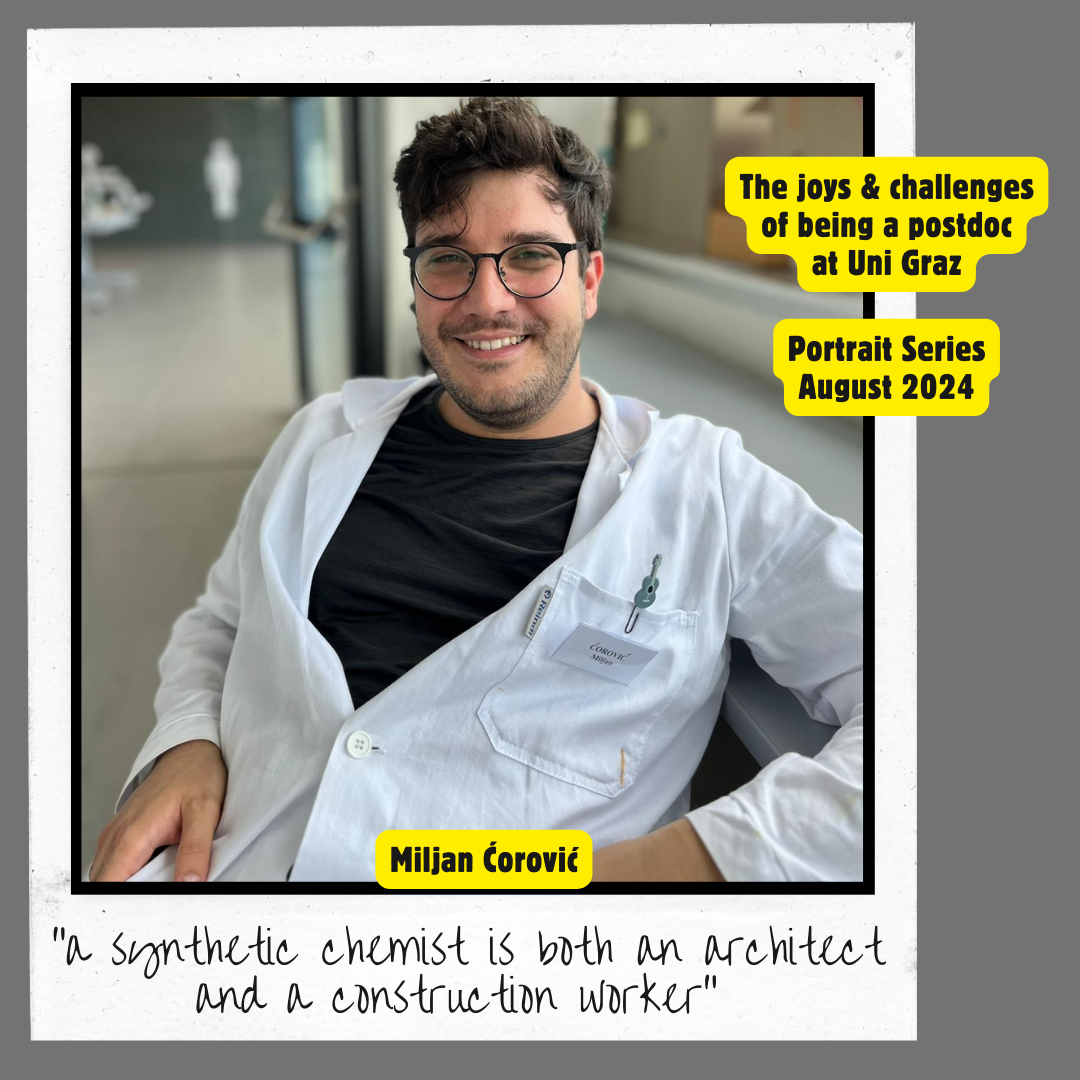This summer, you have the opportunity to get to know some of the brilliant postdoctoral researchers at our university. Our portrait series highlights the diversity within this group of University of Graz research talents - and obviously the fascinating research that they do. Here are four questions for....
Miljan Ćorović, Institute of Chemistry
1) Tell us a little about yourself, and your journey to become a researcher at Uni Graz.
I first became fascinated with science while watching "Dexter’s Laboratory," a Cartoon Network series from the late 90s. At that time, the line between magic and science wasn't clear to me—I imagined scientists as magicians or superheroes saving the world. Since then, my perspective hasn't changed much.
After completing my M.Sc. studies in Belgrade, I wanted to study abroad and found Graz to be an ideal option. It's similar to home but also offers new opportunities—like enjoying a spritzer on Saturday mornings at the farmer’s market or being afraid of ticks in Stadtpark. I earned my PhD at the Institute of Chemistry and found it difficult to leave Uni Graz and my colleagues, so now I work here as a university assistant (postdoc).
2) What are you currently researching, and why do you think it is important (and/or interesting)?
Nature carefully selects chemical elements to build and sustain life. I'm particularly interested in why nature chooses "exotic" elements like molybdenum (Mo) and tungsten (W). These biometals are less familiar in everyday language compared to others like iron or calcium. Molybdenum is present in nearly all forms of life, while tungsten is found in bacteria and archaea.
To understand why nature chooses these metals, together with my colleagues I synthesize various compounds and attempt to replicate the reactivity Mo and W support in natural processes. This biomimetic research provides biological insights and inspires the development of inexpensive, efficient, and environmentally friendly catalysts.
3) What brings you joy in your everyday work life, and what are some challenges?
As a synthetic chemist, I often feel like both an architect and a construction worker. We carefully design, prepare, and analyze our small creations, trying to understand their shape and behavior. While the process of synthesis isn't new to me, the expectation of results always creates a tension that fully occupies me. Will I finally produce a new compound? What will I discover from this attempt? I'm grateful that my curiosity continues to provide adrenaline rushes and never abandons me, despite the occasional frustrations in the lab.
In addition to being inspired by nature's weird choices, I greatly enjoy sharing scientific findings and teaching. Writing, reading, and exploring new ways to communicate science also bring me satisfaction.
The biggest challenge in my postdoc life is the uncertainty that comes with temporary contracts. As a student, there was always a clear academic path to follow, but now it feels like climbing a staircase that's blurry and shifting. This instability can drive people to be more efficient and productive, but it also fuels anxiety. I manage it by giving my best in the moment, celebrating small victories, and planning ahead to secure stability once my contract ends.
4) What's next for you this year/next year?
In our group, we're about to start a new project focused on synthesizing water-soluble, bioinspired tungsten compounds for developing catalysis in water. This should be an exciting shift away from toxic organic solvents toward more sustainable chemical processes.
In July, I'll be attending a big conference in Agra (India), where I'll present on how small molecules can be activated with tungsten complexes.
I'm also looking forward to more events organized by the PostDoc office. Meeting fellow postdocs is invaluable because we understand each other's challenges and can provide support.
Interviewer: Johanna Stadlbauer, June/July 2024. Picture credit: Ćorović/privat
Get to know eleven more researchers and their work joys!
